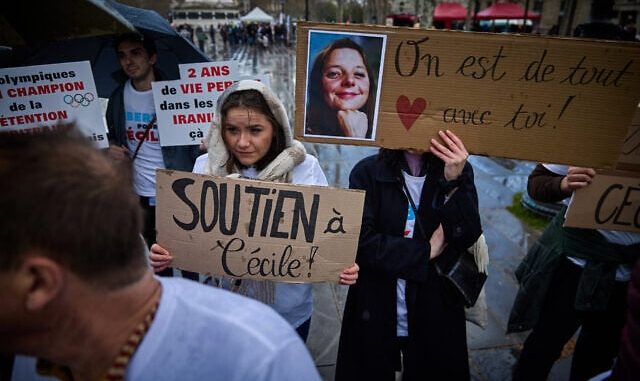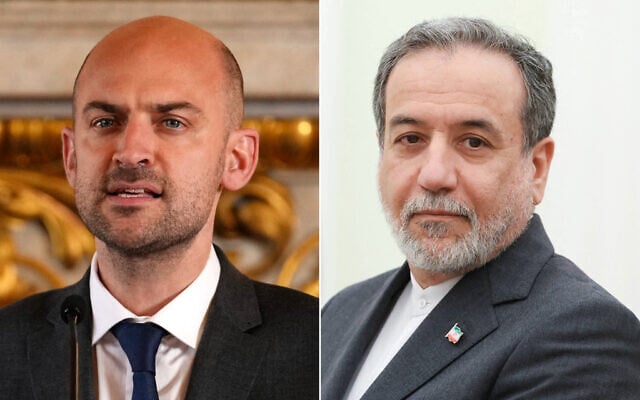
Protesters rally for the release of French teacher Cecile Kohler and her partner Jacques Paris from Iranian prison, at Place de la Republique in Paris, France, on March 23, 2024. (Kiran RIDLEY / AFP)
Published September 12, 2025
French foreign minister repeats call for ‘unconditional and immediate release’ of French teacher and her partner held since 2022 and 18-year-old cyclist detained in July
France is intensifying calls for the immediate release of three of its citizens detained in Iran, after Tehran suggested a possible prisoner swap involving an Iranian national held in France.
The three detainees include Cécile Kohler, a teacher and trade unionist, and her partner Jacques Paris, both imprisoned since 2022. French authorities have long condemned their detention, saying the conditions they face are “akin to torture.” The third detainee is an 18-year-old French-German cyclist who was arrested in July 2025.
Iran’s Foreign Minister Abbas Araqchi recently floated the idea of a prisoner exchange, proposing that the French citizens could be freed in return for Mahdieh Esfandiari, an Iranian student living in Lyon. Esfandiari was detained earlier this year in France over alleged anti-Israel social media activity.
France, however, has made its position clear. Foreign Minister Jean-Noël Barrot refused to address the swap proposal directly, instead insisting that the three citizens must be released “immediately and unconditionally.” Paris has also taken the matter to the World Court, accusing Iran of violating international rules on consular protection.
The case has added fresh strain to already tense relations between the two countries. France, along with Germany and the United Kingdom, recently supported moves at the United Nations to restore sanctions on Iran. Against this backdrop, the detention of French nationals has become a symbol of mistrust and a flashpoint in bilateral relations.
L: France’s Minister for Europe and Foreign Affairs Jean-Noel Barrot speaks at the Ministry for Europe and Foreign Affairs (Quai d’Orsay) in Paris on July 4, 2025. (Aurelien Morissard / POOL / AFP); R: Iranian Foreign Minister Abbas Araghchi is pictured prior to a meeting with Russia’s President at the Kremlin in Moscow on June 23, 2025. (Alexander KAZAKOV / POOL / AFP)
 Implications
Implications
1. Diplomatic Implications
-
France–Iran Relations: Already strained, relations could deteriorate further. France is unwilling to be seen as negotiating under duress, while Iran is signaling it’s ready to use detainees as leverage.
-
European Positioning: Since France acts in step with Germany and the UK on sanctions, this could harden Europe’s united stance against Iran, potentially isolating Tehran further.
-
Middle East Tensions: Iran is trying to show resilience against Western pressure by raising stakes with high-profile detainees, which could complicate nuclear talks, sanctions enforcement, or regional diplomacy.
2. Geopolitical Implications
-
Use of “Hostage Diplomacy”: This case reinforces the perception that Iran uses foreign nationals as bargaining chips. If France resists a swap, it might deter Iran but prolong the suffering of detainees; if France accepts, it may encourage similar tactics by Iran (and possibly other states).
-
Impact on Alliances: The U.S. and EU may align closer on how to handle Iran’s detention strategy, potentially leading to coordinated sanctions or diplomatic action.
-
Precedent for Other Countries: Smaller states with citizens detained in Iran may look to France’s stance as a playbook — either for firmness or for engaging in swaps quietly.
3. Legal Implications
-
World Court (ICJ) Case: France’s complaint frames this not just as a bilateral issue but an international law violation (consular rights, human rights). A ruling could set precedent for how international law protects detainees in such contexts.
-
Human Rights Framework: If conditions are proven to be “akin to torture,” it could raise broader accountability debates at the UN and international rights forums.
4. Domestic Implications (France)
-
Public Pressure: Families of detainees and French citizens will expect the government to act decisively. Mishandling could lead to domestic backlash against President Macron’s administration.
-
National Security Perception: The case highlights risks for French travelers and expatriates in Iran or other hostile jurisdictions, which could affect France’s travel advisories and citizen security policies.
5. Economic Implications
-
Sanctions Pressure: Renewed tension makes economic engagement between Europe and Iran even less likely. French and European companies will remain cautious about trade, energy, or investment in Iran.
-
Regional Stability Costs: Rising diplomatic clashes with Iran indirectly feed into global oil market volatility, since Iran’s role in OPEC+ and the Gulf remains significant.
6. Strategic Implications for Iran
-
Domestic Propaganda: Tehran can frame the detention as a victory against “Western pressure” to boost nationalist narratives internally.
-
Negotiation Leverage: Iran uses such cases to secure concessions — e.g., the release of its own nationals abroad (like Mahdieh Esfandiari in France).
 Overall Takeaway:
Overall Takeaway:
The detention of French citizens in Iran and Tehran’s suggestion of a prisoner swap underscores the high-stakes nature of modern diplomacy, where human lives are entangled in geopolitical struggles. For France, the case is a test of principle — refusing to legitimize hostage diplomacy while fighting to protect its nationals. For Iran, it is both a tool of leverage and a message to the West that it will not be pressured into concessions without extracting a price.
Ultimately, the outcome of this standoff will shape not only Franco-Iranian relations but also broader international norms on how governments respond to the weaponization of detainees. Whether through diplomacy, legal pressure at the World Court, or coordinated action with allies, France’s next steps will signal to the world how far democracies are willing to go to defend their citizens — and whether states that use foreign prisoners as bargaining chips can continue to do so with impunity.
SOURCES: REUTERS – France demands release of citizens held in Iran after Tehran floats prisoner swap
THE TIMES OF ISREAL – France demands release of 3 citizens held in Iran after Tehran floats prisoner swap
FRANCE 24 – France demands release of citizens held in Iran after Tehran floats prisoner swap






Be the first to comment